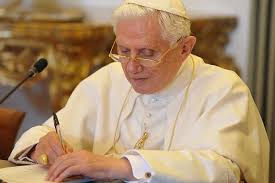BENEDICT XVI
GENERAL AUDIENCE
Paul VI Audience Hall
Wednesday, 28 November 2007
Saint Ephrem
Dear Brothers and Sisters,
Common opinion today supposes Christianity to be a European religion which subsequently exported the culture of this Continent to other countries. But the reality is far more complex since the roots of the Christian religion are found in the Old Testament, hence, in Jerusalem and the Semitic world. Christianity is still nourished by these Old Testament roots. Furthermore, its expansion in the first centuries was both towards the West – towards the Greco-Latin world, where it later inspired European culture – and in the direction of the East, as far as Persia and India. It thus contributed to creating a specific culture in Semitic languages with an identity of its own. To demonstrate this cultural pluralism of the one Christian faith in its origins, I spoke in my Catechesis last Wednesday of a representative of this other Christianity who is almost unknown to us: Aphraates, the Persian sage. Today, along the same lines, I would like to talk about St Ephrem the Syrian, who was born into a Christian family in Nisibis in about 306 A.D. He was Christianity’s most important Syriac-speaking representative and uniquely succeeded in reconciling the vocations of theologian and poet. He was educated and grew up beside James, Bishop of Nisibis (303-338), and with him founded the theological school in his city. He was ordained a deacon and was intensely active in local Christian community life until 363, the year when Nisibis fell into Persian hands. Ephrem then emigrated to Edessa, where he continued his activity as a preacher. He died in this city in 373, a victim of the disease he contracted while caring for those infected with the plague. It is not known for certain whether he was a monk, but we can be sure in any case that he remained a deacon throughout his life and embraced virginity and poverty. Thus, the common and fundamental Christian identity appears in the specificity of his own cultural expression: faith, hope – the hope which makes it possible to live poor and chaste in this world, placing every expectation in the Lord – and lastly, charity, to the point of giving his life through nursing those sick with the plague.
(To continue reading, please see here).

